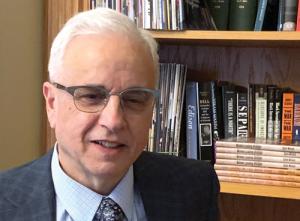An Awkward Though Important Acronym
Steve Mitnick is the Executive Editor of Public Utilities Fortnightly. He has authored four books on the economics, history, and people of the utilities industries. While in the consulting practice leadership of McKinsey & Co. and Marsh & McLennan, he advised utility leaders. He led a transmission development company and was a New York Governor’s chief energy advisor. Mitnick was an expert witness appearing before utility regulatory commissions of six states, D.C., FERC, and in Canada, and taught microeconomics, macroeconomics, and statistics at Georgetown University.
Politicized like so much going on these days, ESG has nonetheless had remarkable staying power. In electric power. In natural gas too. Seems like ESG's prominence is here to stay. Beckoning the Public Utilities Fortnightly team to publish another annual issue on ESG, herein.

Who came up with this three-letter acronym anyway? ESG? Have you noticed that hardly anyone spells it out. That doesn't come as a surprise to me. Spelled out, ESG sounds like gibberish.
Environmental social governance. Huh? Those three words, they don't make a sentence. Nor even a sensible phrase. Those words are as independent as islands in the sea. Shouldn't we place commas between them? Or semi-colons? Periods perhaps, to signify their disconnectedness.
The first word, environmental, doesn't modify the second word, social, or the third, governance. Social is just as hapless grammatically. Environmental and social might be nouns in this context, or they might be adjectives. Who knows? As for the word governance, sitting there at the end of all this, it is a noun no doubt. That much is clear.
The first two words could each be adjectives defining a company that does good as well. As in, this is an environmental company. Or this is a social company.
More precisely I think, the E stands for a standard defining an environmentally conscious company. And the S stands for a second standard, defining a socially conscious company.
But then what gives with the third word of ESG, governance? All companies have some form of governance, of varying scale and quality. From the corner grocer that sells you apples, to two trillion-dollar Apple. The G can't stand for a standard defining a governance conscious company. That doesn't compute.
ESG experts might come back and say, hey Steve, the G stands for a good governance company. Ok. Whatever that means. However that is measured.
Which is probably the point. Measuring. How a company's E, its S, and its G are measured seems to be a preoccupation of everybody from the SEC to the Street.
Because companies that don't measure up, ESG-wise, won't be as successful in today's financial markets as compared to companies that do. Investors and investment firms are indeed scrutinizing the ESG performance of the companies they put their money in.
Those old enough will remember the series of EF Hutton commercials that were ubiquitous on TV in the seventies. An investor would start to tell another investor what investment his EF Hutton broker recommended. Whoever was around in that particular scene, such as in a restaurant, would gather close to listen in on the supposedly sage advice. The commercial would always end with, when EF Hutton talks, people listen.
That's the way it is now with ESG. Virtually any investor wants to know where a company scores on ESG before making a portfolio commitment to it.
And seriously, this is a pretty positive development in corporate finance. Companies that score well are those that are moving in the right direction with respect to their environmental footprint, their workforce and spend diversity, and other qualities that are both good for their communities and financially risk-lowering.
It's a win-win. Making money the old-fashioned way, to paraphrase the eighties TV commercial of Smith Barney, with the iconic John Houseman's baritone voice.


